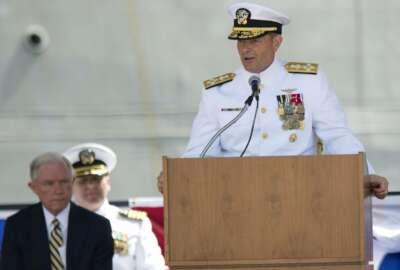
Admiral’s sinking demonstrates old leadership maxim
Former Navy Adm. Bill Moran's early retirement demonstrates an old lesson in sticking to the rules.
He didn’t run a battleship aground. He didn’t preside over a “tailhook” style hullabaloo. He didn’t embezzle government funds. He didn’t take a bribe. He didn’t mistreat subordinates of the opposite sex.
He used Gmail.
And it cost him a job for which he’d spent a distinguished career preparing.
I confess I feel badly for former Navy Adm. Bill Moran. How bitter to have been confirmed by the Senate as the new chief of Naval Operations, only to have to bow out and retire instead. Still, at that level, everyone knows the rules, written and unwritten. In reality, Moran’s downfall was about more than using a private email account for official business.
The report from the Defense inspector general details Moran’s transgressions. The official email correspondence wasn’t between him and just anybody — it was largely between Moran and a now-retired commander, Chris Servello, who had been drummed out of his job in public affairs after he’d engaged inappropriately with junior female officers and civilians at a Christmas party. He was still in the Navy for a while in “permissive temporary duty status.”
That incident even dinged then-CNO, Adm. John Richardson, because he’d waited months, after deciding to remove Servello, before he executed the move. That drew a congressional chide, and an apology.
What really sunk Moran was the nature of his correspondence, of his post-facto relationship, with Servello, someone he’d known and liked. It was the type of correspondence he’d have had, had Servello still been the CNO’s public affairs chief.
As I said in my discussion about the matter with Federal News Network’s Jared Serbu, Moran wasn’t exchanging mere pleasantries like, “how are the kids?” The correspondence concerned speeches, testimony, articles and the like, as well as Navy strategy and his plans as CNO. Servello sent back advice and counsel.
And, Moran used that Gmail account, a cut-and-dried violation of law and regulation. He used it for official communications with a dozen other people besides Servello. Moran trotted out the complaint that in remote and mobile situations, military IT makes email communications difficult or unreliable. That’s an explanation, but, unfortunately, not an excuse. As the IG put it, “… convenience is not an acceptable reason to use personal email to conduct ‘official DoD communications.'”
As for the relationship with Servello, Moran told the IG, “I tried to explain that [the Navy commander] was a colleague and a friend who disappointed me terribly on a personal level, but on a professional level that he has an awful lot to offer to make senior leaders like me think clearly. So, the optics for some will be that … ‘I don’t get it when it comes to sexual harassment policy, don’t take it seriously.”‘
Yes, but that wasn’t the whole problem. It was more that Moran continued to rely on Servello against the stern advice of Richardson.
The IG found the Moran-Servello relationship not a matter of misconduct, but rather what it called a performance issue.
Related Stories

Changing Forest Service’s harassment culture means changing behavior, including leadership
Officers in the stratospheric ranks operate in a fairly unforgiving place. They might be surrounded by aides, drivers, cooks and nice quarters. On my first visit to a general in the Pentagon many years ago, I was surprised to see a major take the general’s coat and hang it up. But in their own minds, senior officers must remain just soldiers, sailors, airmen and marines. Even small mistakes at that level have more potential consequence than for a low-ranker. Flag officers have the power to change doctrine, but the obligation to demonstrate the most fidelity to the rules.
Copyright © 2025 Federal News Network. All rights reserved. This website is not intended for users located within the European Economic Area.
Tom Temin is host of the Federal Drive and has been providing insight on federal technology and management issues for more than 30 years.
Follow @tteminWFED





